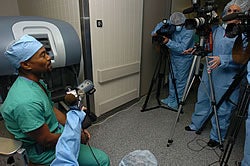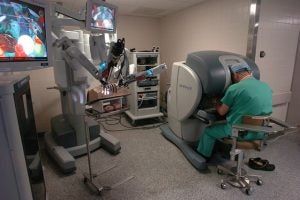Medical center adds third surgical robot
GREENVILLE, N.C. — East Carolina University physicians showed off their newest surgical robot and touted its benefits to patients and the wider eastern North Carolina community Thursday.
The new $1.5 million Intuitive Surgical da Vinci S Surgical System, bought by Pitt County Memorial Hospital and in use in the hospital’s operating rooms, is the medical center’s third. Another da Vinci system, delivered in 1999 and the second one produced by Intuitive Surgical, is also used in surgeries while the other robot is used for training and research in the Warren Life Sciences Building on ECU’s health sciences campus.

Dr. Dieter Bruno discusses urologic surgery with reporters during a press conference to introduce the newest da Vinci surgical robot at PCMH. Photo by Cliff Hollis
Dr. W. Randolph Chitwood Jr., ECU senior associate vice chancellor for health sciences, chief of cardiothoracic and vascular surgery at the Brody School of Medicine and a robotic surgery pioneer, said the new da Vinci model has several improvements including smaller size, better vision and controls, and more capabilities. It will allow ECU and PCMH to offer robotic surgery to more patients than before with the advantages of smaller incisions and shorter recovery times.
“It’s a very important step in the evolution of robotic surgery,” said Chitwood, who’s also director of the East Carolina Heart Institute.
The new device arrived Nov. 15, and Chitwood used it the next day to perform the 300th robot-assisted mitral valve repair done in Greenville. He’s since done four more repairs. In May 2000, Chitwood performed North America’s first robot-assisted total mitral valve repair at PCMH.
“We’re clearly the number one program in the state,” said Chitwood, who uses the robot for nearly all mitral valve repairs and whose patients come from around the globe. “We plan to contribute to the nation and the world’s health.”
But heart surgery isn’t the only use of the da Vinci system. Surgeons also use it for gynecologic, urologic and general surgery. While Chitwood demonstrated the new robot for reporters, Dr. Dieter Bruno, a urologist and assistant professor at ECU,performed a prostate removal in a nearby operating room using the older da Vinci robot.
Bruno, who practices at Eastern Urological Associates in Greenville, said the da Vinci machine means leading health care technology is available to eastern North Carolina where a generation ago patients went to Raleigh, Richmond, Va., or Norfolk, Va., for care.
“This allows our patients to get top-notch care without having to go anywhere,” Bruno said.
Bruno has performed more than 30 prostatectomies with the da Vinci system since 2004. Nationally, about 20 percent of all prostatectomies are now performed robotically, and the majority will soon be done that way, Bruno said.
One of Bruno’s patients, Duncan Charlton, of Kinston, said that after learning about the da Vinci system and its benefits, it was a logical choice when he needed his prostate removed due to cancer. His father-in-law had a prostatectomy using the da Vinci system shortly before Charlton was diagnosed with cancer.
“I prayed a lot and had a lot of people praying for me,” Charlton, 52, said. “I just had an open mind for this surgery and have been very happy with it.” Since his March operation, tests have shown no remaining traces of cancer, he said.
Bruno described the machine as intuitive, and said young surgeons used to playing video games can quickly learn to use it.
Dr. L. Wiley Nifong, associate professor of surgery and director of surgical research at the medical school, agreed.
“My nine-year-old can suture and sew,” said Nifong, who’s also director of surgical robotics for the East Carolina Heart Institute. Middle-school children are the fastest da Vinci learners, he added.
More than 500 surgical teams from approximately 330 institutions around the world have learned to use the da Vinci system at ECU, Nifong said.
The da Vinci Surgical System, made by Intuiti

Dr. W. Randolph Chitwood Jr. demonstrates the new da Vinci S Surgical System. Photo by Cliff Hollis